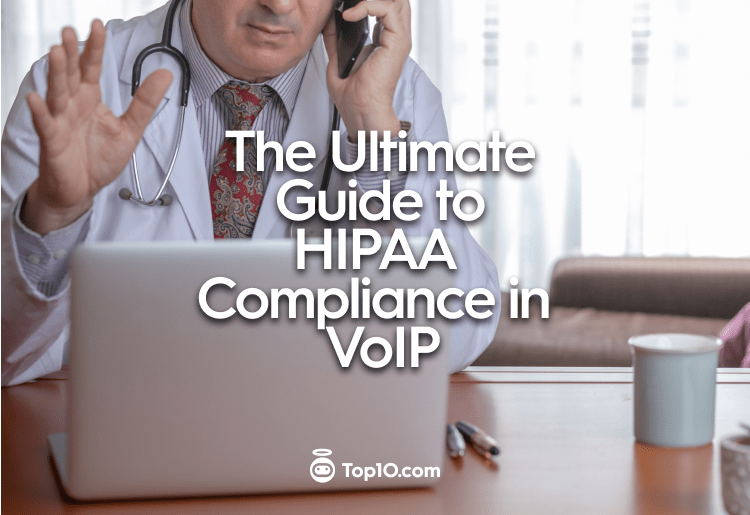As a technology specialist, I'm here to help you navigate the complexities of HIPAA compliance in VoIP services. We'll explore concepts like HIPAA's privacy and security rules, the importance of business associate agreements (BAAs), and vital VoIP features designed to protect electronic Protected Health Information (ePHI).
Non-adherence to HIPAA regulations can lead to severe consequences, including fines of up to $68,928 and legal complications that could put your practice at risk.
Moreover, I'll provide the insights you need to choose the ideal VoIP system and ensure perfect harmony between seamless communication and stringent data protection measures.
» Try these tips to future-proof your VoIP system.
What is HIPAA, and Why is it Important for Healthcare VoIP
The Health Insurance Portability and Accountability Act (HIPAA) establishes strict guidelines for managing and storing patient metrics, physically or digitally. When choosing an internet phone system for your practice, it's essential to make sure it follows HIPAA rules.
Look for a service like RingCentral that uses strong encryption to protect data, only lets authorized people access it, and has tools to watch for and stop information leaks. With a HIPAA-friendly VoIP provider, you can communicate easily while keeping patient records safe and secure.
Let's take a look at some HIPAA considerations for VoIP systems:
The Privacy Rule
HIPAA's Privacy Rule does more than just say health information is protected. It gives you specific steps to keep it secure, like risk assessments and training your staff. These actions work together to keep records private for everyone in healthcare, from patients to providers.
It also gives you technical guidance to boost security further. One example is encryption, which scrambles data when it's transmitted. This ensures that the records can't be read by unauthorized people.
The Security Rule
The HIPAA Security Rule sets the national standard for protecting patients' electronic health information (ePHI). This works hand-in-hand with the Privacy Rule to ensure you have the right technical and non-technical measures to keep data safe.
Here's how the Security Rule creates a powerful system:
- Provides users with unique logins to ensure that only authorized individuals can access the information.
- Maintains an audit trail that records who accessed data, helping to identify any unusual activity and promote accountability.
- Employs robust encryption to encode the details during transmission, preventing unauthorized people from reading it.
Sources of Electronic Health Information (ePHI)
A HIPAA-compliant phone service, like Dialpad, must protect various sources of ePHI, including:
- Caller ID: links patients to your practice, revealing their association even without recordings.
- Recordings and transcripts: voicemails, call recordings, and their transcripts can hold sensitive patient data.
- Electronic messaging: SMS and fax-to-email services generate digital records that need protection.
- Digital platforms: chat or video conferencing tools can archive ePHI in its history.
Business Associate Agreements (BAAs)
You may need to share patient data with your VoIP service to provide comprehensive care, just as you would with pharmacies or transport services. Ensure your VoIP company understands its role in protecting patient privacy by having a clear business associate agreement.
The contract should:
- Define each party's responsibilities in protecting patient information and complying with HIPAA.
- Outline how services like Vonage can handle health data.
- Specify the security measures that platforms must implement.
- State the consequences for failing to follow regulations.
» Ask these questions before signing up to a VoIP provider.
Can VoIP Phones Be HIPAA-Compliant?
Yes, VoIP phones for healthcare, hospitals, and medical offices can be HIPAA-compliant when proper measures are taken to ensure the security and privacy of patient information. Here are the key aspects of maintaining HIPAA adherence with VoIP systems like Zoom Phone:
End-User Training for HIPAA Compliance
Comprehensive staff training is key to keeping health data secure. Clear guidance on using technology properly helps employees minimize mistakes and follow HIPAA rules. Training should cover creating strong passwords, avoiding sensitive record access on unsecured networks, and disposing of confidential documents correctly.
Ongoing Staff Education and Monitoring
Regular staff training sessions are also essential for employees to stay updated on using technology and tools effectively. This could include training on reducing VoIP latency and mastering VoIP protocols and standards.
Monitoring systems, working in tandem with staff training, provide additional protection by tracking information handling and promptly identifying potential issues. This combined approach ensures that robust security measures remain effective in safeguarding sensitive data.
The Future of Secure Healthcare Communication
New changes in cybersecurity are helping the healthcare field strengthen its protection against growing online threats. Robust encryption methods hide patient information from even the best hackers. Using AI technology in non-fixed VoIP has also greatly improved safety measures.
AI stops attacks before they can even start, lowering the risk of data leaks. This approach helps to protect private records and shows the importance of cybersecurity in patient safety.
Balancing Efficiency and Security in Healthcare
Achieving HIPAA compliance for VoIP technology in healthcare is a multifaceted task that demands collaboration among healthcare organizations, VoIP providers, and employees.
By following HIPAA's privacy and security guidelines and implementing well-defined business associate agreements—you can harness the benefits of VoIP while protecting patient information.
» Discover 10 ways IoT integration with VoIP can transform your business.

